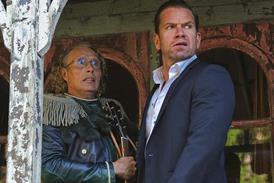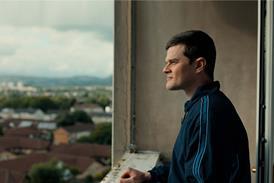Okay, confession time. Once, in Cannes 2005, I walked out of a film I was supposed to be reviewing. I queued for a press screening of another film, realised I wasn't going to get in, and went back to the film I'd walked out of, drawn by an impulse I didn't quite understand. I probably missed about seven or eight minutes but wrote the review anyway.
As crimes go, that's not on a level with incest, genocide or owning a James Blunt CD but it's still pretty bad for a film critic.
Let me offer some small, craven words of self-justification. The film was the Romanian title The Death Of Mr Lazarescu. As hardly anybody knew anything about it or the director, Cristi Puiu, it had been marked as a borderline review candidate - one that I would write up only if it turned out to be interesting. And the seven or eight minutes I missed were a drop in the ocean of a film that lasted more than two-and-a-half hours.
After the screening, I was unable to get the film out of my head. I spoke with another British journalist who had been in the same screening and had done exactly the same thing. He'd left around an hour in, swept along by the tide of walkouts (there is a moment in certain festival press screenings when walkouts reach a kind of fission point, and become difficult to resist). But outside, on sober, coffee-fuelled reflection, he had rebelled against the herd and dived back in.
Gets ill, gets worse, dies
There are films - and Mr Lazarescu is one - that work on a subcutaneous level, tugging against what can only be described as the irritation of the viewing experience. I've felt this sensation before (Kiarostami's The Taste Of Cherry) but never as acutely as in this near real-time story of an alcoholic pensioner in Bucharest who is taken ill, gets worse and dies.
Another film-maker who does something similar is Abdellatif Kechiche, whose third feature, The Secret Of The Grain, premiered in competition at this year's Venice festival. Though it also clocks in at more than 150 minutes, the film has a more conventional dramatic arc than Mr Lazarescu, at least on the surface. It's about Slimane, an ageing Tunisian immigrant dockyard worker in the South of France, who is laid off and decides to open a couscous restaurant.
Classic motivational stuff, you might think - the hero has a dream which, after various setbacks, is finally realised. Except that Slimane's desire to open a restaurant is not even mentioned until it is suddenly revealed that he has bought a rusting ship for the purpose (thus missing out on a whole slew of potential buying-the-ship challenges). Plus Slimane is frustratingly unenthusiastic about his dream; he's passive, taciturn and more than a little morose.
Dramatic white noise
But Kechiche seems to like infuriatingly passive heroes (there was another one in his last film, L'Esquive) and he's only intermittently interested in plot. He keeps derailing the narrative drive of The Secret Of The Grain with a series of drawn-out scenes - including one of a family dinner that runs for around half an hour - during which you would be hard pressed to answer those routine screenwriting manual questions, 'What is the purpose of this scene'' and, 'How does it move the plot forward''
So why was this year's Venice film the one that, more than any other, got its hooks into me and wouldn't let go'
Maybe it has something to do with the fact Kechiche, like Puiu, replaces conventional dramatic structure with a series of continual micro-dramas that mirror more closely the way conflicts unfold and people interact in real life. Rather than the clean narrative waveforms of most feature films, we get a messier but somehow more genuine continuum, a sort of dramatic white noise that is not always easy to take.
As the final credits were rolling at the Venice press screening of The Secret Of The Grain, a French journalist stood up and said, in a contemptuous tone: 'C'est la negation du cinema!' I already liked the film, but that comment made me suspect it might just be a masterpiece.















![[Clockwise from top left]: Paul Thomas Anderson, Chloe Zhao, Ryan Coogler, Park Chan-wook](https://d1nslcd7m2225b.cloudfront.net/Pictures/274x183/9/0/0/1467900_writerdirectors_192733.jpg)


No comments yet